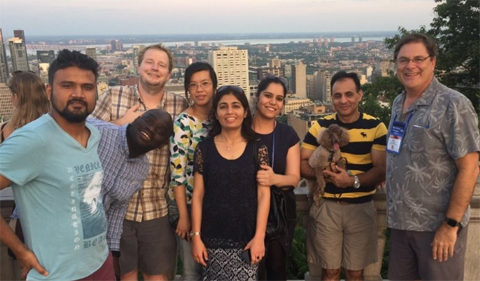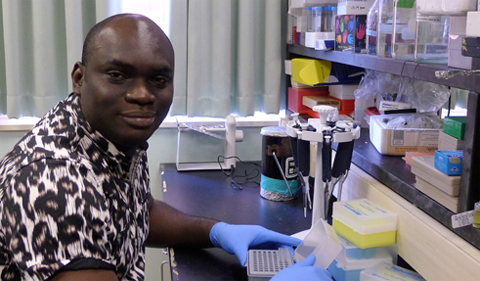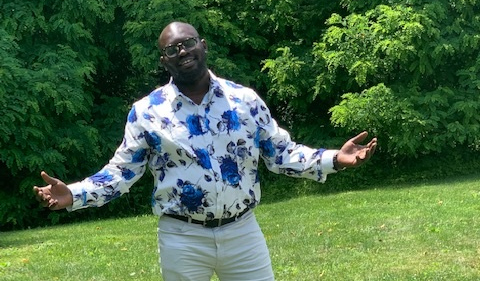As Oyeyemi Ajayi leaves Athens and heads to Penn State this month, his family is a little bigger, having welcomed a daughter, and his title is a little longer, having added a Ph.D. in Environmental & Plant Biology.
He’s leaving cozy Athens for Happy Valley, another rustic college town. And he’s still in pursuit of answers about plant cell walls and their biofuel potential.
“Plant cell walls are made up of complex sets of sugars, and little is known about how these plant cell wall sugars are synthesized, formed and assembled,” Ajayi said. “The search for bio-renewable energy sources has taken the center stage, especially in the wake of global climate change, and research efforts over the years have been directed at the deconstruction of plant cell walls for use as sustainable energy sources for biofuel production.”
Within a big set of unanswered questions about the thick, somewhat rigid barrier of the plant cell, Ajayi chose to focus on one type of sugar. As part of the Molecular and Cellular Biology program at Ohio University, he conducted research involving examining genes and the making of proteins, work that he’ll continue as a post-doc at Penn State.
Q: What did your dissertation research entail?
A: An important enigma that I considered worth unraveling during my Ph.D. was to investigate one of these sugars called glucuronic acid. Specifically, my goal is to understand the functional roles of three genes/enzymes involved in the transfer of glucuronic acid sugar to plant cell wall arabinogalactan proteins and their concomitant effects on plant growth and development.
This glucuronic acid sugar is important because it binds to calcium, and calcium is very important in virtually all aspects of plant growth and developmental processes. I considered this an exciting area of study because we can genetically manipulate these genes for improved biomass for bioenergy production.
My first task was to utilize the tools of bioinformatics to systemically characterize glucuronic acid transferase genes, and that was published in Scientific Reports. The second work I conducted was to characterize three of these glucuronic acid transferase genes by investigating their biochemical and physiological functions using both transfer DNA and CRISPR-Cas9 generated Arabidopsis mutants. This part of my work was published in Plants. The third research was aimed at understanding the genetic basis of mucilage matrix organization and assembly using Arabidopsis mucilage as a model organism, and this work was published in BMC Plant Biology. The fourth manuscript is currently under review in a scientific journal and exemplifies the important role glucuronic acid sugar plays in Arabidopsis sexual reproduction.
Q: What’s your next step as a post-doc at Penn State?
A: At Penn State, I will continue to use the tools of bioinformatics (next generation sequencing), cell and molecular biology, biochemistry, and microscopy techniques to elucidate the molecular basis of plant cell wall formation and assembly.
Q: Did you get any opportunities to attend or present at conferences while you were at OHIO?
A: Oh yes. I was able to present part of my work at both local, national and international conferences. I was also invited to give a talk at the University of Illinois at Urbana-Champaign at the America Society of Plant Biologists Midwest meeting, but that meeting was canceled due to the COVID-19 pandemic.

The Plant Wall Group enjoying a night out at the ASPB meeting in Montreal. From Left: Matrika Bhattarai, Oyeyemi Ajayi, John Elmore, Yuan Zhang, Tasleem Javaid, Dasmeet Kaur, Ahmed Faik (with Star), and Allan Showalter.
Q: Who were your favorite professors and mentors, and how did they make an impact on your life?
A: I have a lot of people that have impacted my life. I appreciate my Ph.D. adviser, Dr. Allan Showalter, who gave me the platform to conduct my research in his lab. Also, Dr. Sarah Wyatt, Dr. Michael Held, Dr. Ahmed Faik, and Dr. Zhihua Hua have all contributed significantly to my scientific journey and have helped me to acquire significant intellectual and technical skills.
Q: What was the hardest hill you had to climb (not counting Jeff Hill) at OHIO? And how did you overcome challenges or obstacles in your path?
A: There is a common saying that science is not linear, and this is because of its unpredictable twists and turns. Often times, you leave the lab, but the lab never leaves you. You go home trying to figure out where things went wrong. Over thinking what has failed has never worked for me and only increases the pressure between your ears. Sometimes, you might want to focus on something else or take a break from the lab and come back feeling more energized to tackle the problem. This is critically important for your mental health, and practicing a work-life balance is key to ensure mental stability. Having work-life balance is really important.
Q: What are your favorite OHIO memories?
A: Playing soccer has definitely been a good experience for me. Also, we had our daughter, Sarah, at O’Bleness Hospital. Also, all my friends at New Covenant Campus Fellowship have really showed me love, and they all are my best friends anytime, any day.
Q: What’s the one thing you would tell a new OHIO student not to miss?
A: I would tell a new OHIO student not miss out on all of the outdoor activities, such as, a boat ride at Strouds Run or a walk along the river. They are great stress relievers during intense academic exercise.
Editor’s Note: The Happy Beginnings series features recent College of Arts & Sciences graduates who are getting started in careers, graduate school and service.





















Comments